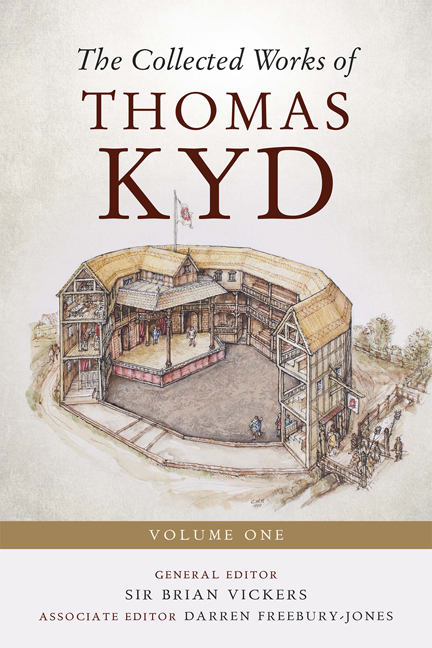Verses of Praise and Joy (1586)
Published online by Cambridge University Press: 16 May 2024
Summary
INTRODUCTION
Verses of Praise and Joy (VPJ) is a slim volume of poetry published in the immediate wake of the 1586 Babington Plot, a conspiracy to assas-sinate Elizabeth I and place her Catholic cousin Mary, Queen of Scots, on the throne in her stead. While the contents of VPJ certainly express joy at Elizabeth's delivery and praise her governance, they also pour scorn on the plotters and their ideological motives, and revel in their punishment. One of the verses in this volume is signed ‘T.K.’, and although no evidence unambiguously identifies him, circumstantial and linguistic evidence make Thomas Kyd the likely author. The text of the present edition reproduces the whole volume, including one poem certainly not by Kyd, a ‘lamentation’ by the Babington conspirator Chidiock Tichborne (c. 1558–86) written on the eve of his execution. Although various components of the printed volume circulated separately, the 1586 publication was evidently designed as a suite of texts to be read together, and there seems no reason to disagree with Boas's suggestion that ‘T.K. was the writer of the whole tract’ (Tichborne's poem excepted).
CHIDIOCK TICHBORNE AND THE BABINGTON PLOT
The assassination plot has come to be named after one of its ringleaders, Anthony Babington (1561–86). But it was Tichborne who responded in verse to the plot's failure, setting up the poetical response of VPJ. Tichborne was born in Southampton to Roman Catholic parents, Peter Tichborne and Elizabeth, née Middleton. As a young man, he had travelled on the Conti-nent without a licence and, with his father, had been interrogated about illegal ‘popish relics’ brought back from abroad. In June 1586, just two months before the plot was exposed, the family had faced another accusa-tion of ‘popish practices’. In May 1586, Babington was visited by the Jesuit priest John Ballard, who told him of John Savage's plans to assassinate the Queen; the two men began to gather conspirators, including Tichborne. Letters to and from Mary were intercepted by Gilbert Gifford, a government plant among the conspirators, or by Thomas Barnes, then deciphered by Thomas Phelippes for Sir Francis Walsingham, resealed, and sent on to the intended addressees..
- Type
- Chapter
- Information
- The Collected Works of Thomas Kyd , pp. 51 - 74Publisher: Boydell & BrewerPrint publication year: 2024

